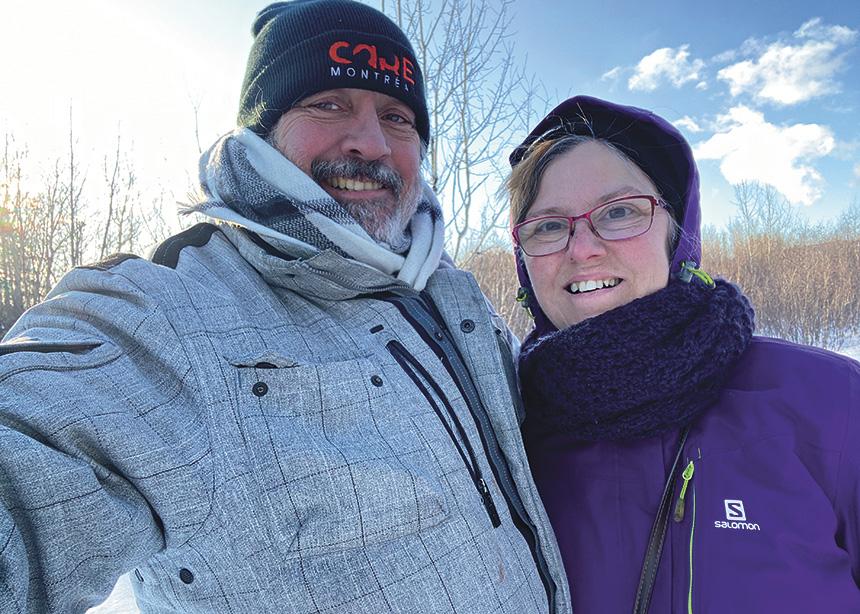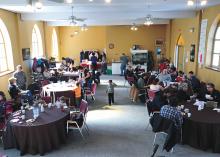When I was first called to church planting work in 2004, I prayed and sought God’s will. I also read Ray Bakke’s book, Hope for the City. It invited me back to the city. The book extols God’s love for the city and invites Christians to abandon the suburbs and come back to the city.
At that time, the Hochelaga-Maisonneuve neighbourhood of Montreal was recovering from the biggest gang war in the city in the 20th century. That is when God convinced me and my wife, Lyne Renaud, to move to Hochelaga. It is when the darkness is thickest that one small light, no matter how thin and weak, can make all the difference. Thus began my journey among the marginalized and the most destitute.
What I want to share with you is the approach Lyne and I used in this neighbourhood. We arrived with a firm conviction that God was calling us to plant a church. At that time, churches and church-planting movements focused on Sunday services and growth in baptism and membership.
A successful church was a large church. At a planters’ boot camp, when I was already thinking about starting a non-traditional church, the teacher shared how to plant a non-traditional church, but gave examples of the traditional services in the church, such as Sunday worship, worship team, Sunday school, senior services, singles services and teen services.
My journal at the time—July 2005—reads as follows: “It would seem that planting a non-traditional church is a two-fold, counter-current exercise and a double-edged sword: the sword of society that has rejected God and the church, and the sword of the church that is looking for Sunday meetings that are bound to a tradition imported from the United States.”
We needed to experiment with a new model. In doing so, I faced the misunderstanding of my call and the fear of the leaders around me.
Numbers game
In those days, I had to report to the denomination every three months on the number of baptisms, new members and evangelism activities. It was an exercise in mental torture. My reports were not impressive. The model was wrong.
I was so fed up that one day I reported: “Here is the number of church members in Hochelaga: 50,000. They are all church members because they live in the neighbourhood. They simply have yet to know they belong to the Body of Christ. If you need an update, the government conducts a census every four years. That will give you an idea of how things are moving. I am not responsible for how God is convicting of sin and righteousness; I am just a crossing guard of hope.”
We set about finding ways to help our neighbourhood emerge from the darkness. To do this, we had to get to know it. We got help from Christian Direction, an organization that hired students to do an exegesis of the Hochelaga-Maisonneuve neighbourhood. Our goal was to understand the neighborhood’s history, where it came from and what was in it: the organizations, businesses, politics, residents, their income, and leisure and social conditions, etc. From this exegesis came findings on which we then based our actions.
It was inconceivable for us to plant a church without it having a positive impact on the neighbourhood. The church in an underprivileged neighbourhood cannot be content to simply offer a Sunday service. The Sunday model must be accompanied by concrete actions in the daily lives of the neighbourhood’s people. Many churches have come and gone from this neighbourhood with locals barely noticing their arrival or departure.
Challenge
Planting a church in a poor neighbourhood requires surrender. You must give up your pride and look for what God is already doing there. God is at work before and after you arrive. Do not be so arrogant as to think that you have the solution. You are not a church planter. Christ is the planter. You are tools in his hands.
It is Christ who calls his church and establishes it. You are a catalyst for what Christ is already doing in the neighbourhood. The crossing guard directs, protects people and controls traffic so that all are safe. The chaplain teaches, instructs and coaches the individual on both the spiritual and personal aspects of life.
When working in a very poor and destitute area it is very important to understand and accept that the church will remain small and changing. It is very difficult for people to continue to witness poverty and human misery in a constant and ongoing way. Only a handful of people can do this. It took me a long time to accept this. People will come and go from the church, and leaders and members will be renewed. It is even possible that what you are doing will not last and will not pass the test of time.
Proclaiming forgiveness
A man used to come to church on Sunday mornings and enjoy breakfast there. He lived on the streets, used alcohol and drugs, and came to church drunk and drugged. He would visit us during the week as well, and take the time to call his mom from the church. He lived in a crack house, a boarding home for destitute people and drug users.
He told us that he liked to cook, so my wife suggested that he invite us to his house. We gave him a gift card for the grocery store. We told him that we would go to his house for dinner with him and his friends the following Saturday.
When I got there, I prayed that God would protect my stomach because his hands, the table and the pots were unsanitary. But God knew what he was doing. We prayed before eating. During the meal, customers came and went as they bought drugs from one of the men at the table. A man came in who did not want to eat because he felt unworthy to be with us at the table. He told me about his nightmares and bad dreams, and that he did not know how to make them go away. He also shared that he did not know how to stop doing what he was doing.
I looked at him and said: “Today, I forgive you of all your sins. When you have another bad dream, just invite Jesus into your dream, and where you sleep, you will sleep in peace.”
This man accepted that Christ gave his life for him, and he was baptized a year later. Today he is a street worker and helps others get off the streets. Does he relapse? Of course. Who among us does not? Jesus has forgiven all his sins, past, present and future. Being a hope brigade sometimes means having the courage to give hope where it seems least likely to be received.
We returned home that night with the feeling that we could have left the neighbourhood then and there, and that Jesus had healed those with whom we had shared a meal. To be dignity chaplains is to bring dignity where it is absent.
Open house
Since we began the journey of being followers of Christ, my wife and I had always opened our home. When we arrived in Hochelaga, it was no different. The Lord gave us the house so that we could bring some light to a very dark and murky neighbourhood that had just come out of a bloody gang war where cars were exploding, and men and children were being killed in the street. The house was a hotel, a restaurant and a hospital. Everyone who knew us could come and go. In addition to our family, there were always guests at dinner. We ate and lived together.
Our life was open to everyone. One day, I was going out to work around 8 in the morning and someone was coming in at the same time. I prayed to God that day and asked him if I could have my house to myself. His answer was clear and instantaneous: “Your home is here with me. You are just passing through and this house belongs to the kingdom.”
Making disciples means taking time, sharing your life and being vulnerable with those God sends to you. It requires self-denial and involvement: It is our mission.
Much has changed since our first summer in the neighbourhood, when we invited neighbours to a few barbecues and a corn roast for Labour Day. With God’s help we have developed a small community that helps each other, warns each other, watches over each other, removes snow and invites each other over from time to time. It is the Holy Spirit who convicts us of sin and righteousness. It is up to us to love without expecting anything in return. It is God who calls the church and establishes it. Our mission is to make disciples one person at a time, without an agenda or plan. Only love.
Michel Monette works with new leaders and congregations in Quebec and Ottawa, in addition to his work in Hochelaga. This article is adapted, with permission, from the MC Eastern Canada “Church Planting Resource.”
For discussion
1. To what extent are you and your congregation engaged with “the least of these?” Who in your church’s neighbourhood would notice if your church closed or moved?
2. As a church planter, Michel Monette describes himself as “a crossing guard of hope,” and “a catalyst for what Christ is already doing.” What is unusual and/or hopeful about these images?
3. What is the role of hospitality in church planting, and in church life generally?
4. Monette says the mission of the church is to make disciples “without an agenda or plan.” Do you agree? Why might it be hard to let go of agendas and plans?
5. Monette proclaims a hurting man’s sins forgiven. To whom might you and/or your congregation offer forgiveness?
—CM Staff






Comments
There is something triumphalistic in the approach in the following quote: "We set about finding ways to help our neighbourhood emerge from the darkness." I think this betrays a triumphalistic theology.
Add new comment
Canadian Mennonite invites comments and encourages constructive discussion about our content. Actual full names (first and last) are required. Comments are moderated and may be edited. They will not appear online until approved and will be posted during business hours. Some comments may be reproduced in print.